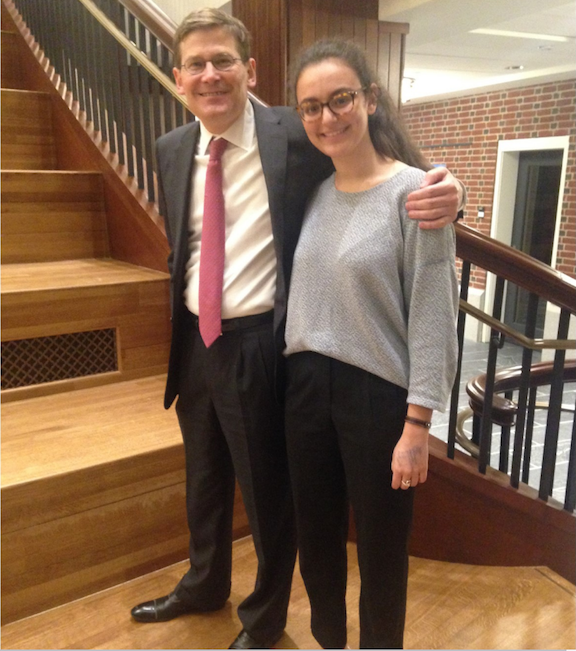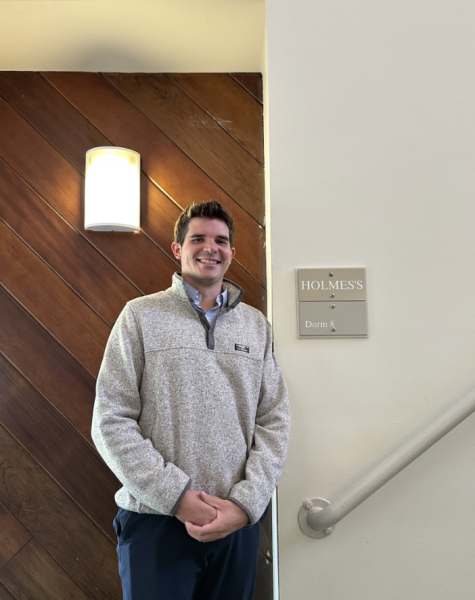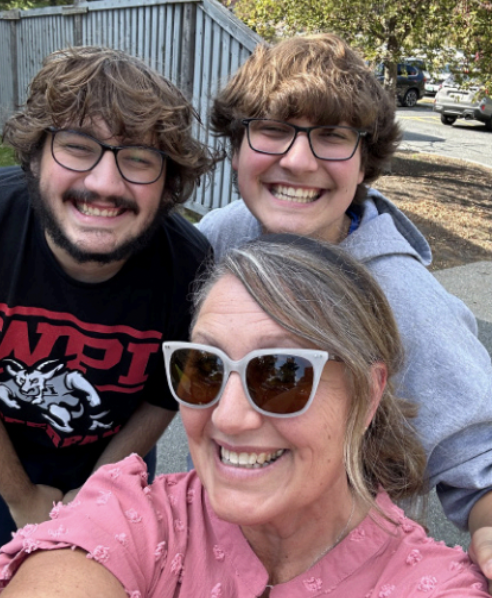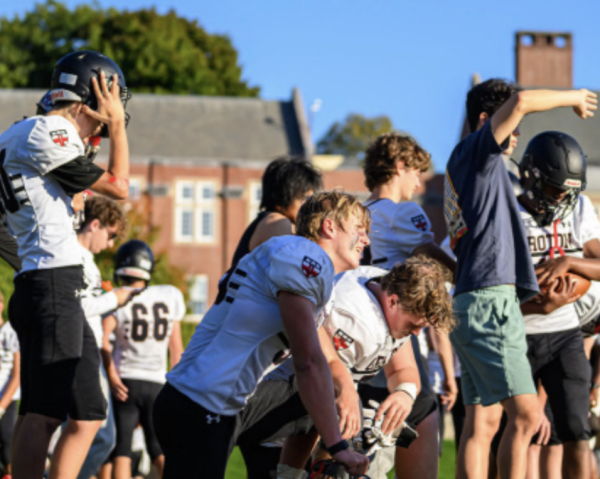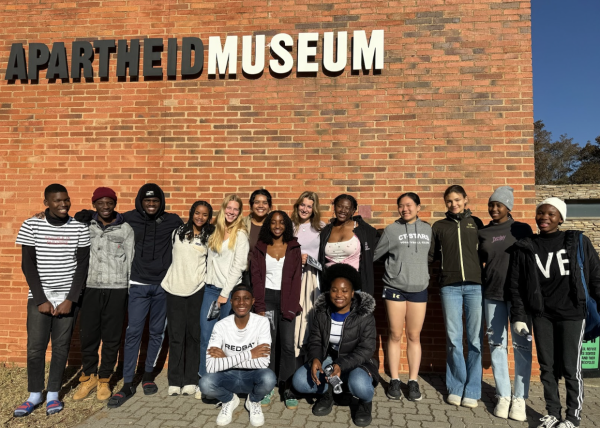007 ON THE CIRCLE
FORMER CIA DEPUTY DIRECTOR SPEAKS AT GROTON
Victoria Wahba ‘17 stands with Mike Morrell after his lecture.
As he walked into the Sackett Forum, silence hung in the air. In front of the students stood a man who once breathed the same air as Al-Qaeda. Victoria Wahba ’17 invited Mike Morell as the third speaker in her lecture series, “Understanding the Middle East.” Mr. Morell, worked within the Centeral Intellegence Agency for 33 years.
Morell’s career has been characterized by service and resilience. He joined the CIA in 1980, but without intention of fully committing. He planned on applying to graduate school in order to receive his Ph.D in economics and teaching.
Once in the agency, he began to work as an analyst and manager tracing international energy issues in East Asia. Morell then served as the presidential intelligence briefer for Presidents Bill Clinton and George W. Bush. Mr. Morell was by President Bush’s side when news of the 9/11 attacks broke.
After serving as an executive assistant to the CIA Director, Morell was assigned to a covert assignment overseas. From 2006 to 2008, he served as the deputy director for Intelligence at the National Counterterrorism Center. Then, until 2010, he served as the deputy director of the CIA.
Morell became intensely involved with counter-terrorism after 9/11. Surreal moments, such as his experience with the president on the day of the World Trade Center attacks, made terrorism personal for him. In August of 2010, during a Counter-Terrorism meeting, two directors notified him of Bin Laden’s closely affiliated courier named Kahli C. Muhammhad.
Declared top secret, the CIA investigated this lead for five years to get to Bin Laden.
“Shivers went down my back, because it’s that feeling that [Bin Laden] might be there—you just knew it,” he recollected in his talk.
Today’s world news continuously shows the horrific terrorist attacks done by groups such as ISIS, but Mr. Morell reminded students that Al-Qaeda affiliates still remain active all over the world. What makes ISIS different from previous groups, he explained, is that it thrives as a state with its own government, military, and police. As a state, the group is able to use every possible resource in their borders. Oil, research laboratories, and land are all at the group’s disposal. In some way, ISIS is a revolutionary political movement, Morell explained.
He went on to speak about how ISIS creates threats in two ways: directly and indirectly.
Through social media, ISIS blasts out extremely compelling propaganda—a call for global citizens to come defend the caliphate and go against western forces and to take up arms where they live against their enemies. Mr. Morell explained that this was their form of direct recruitment.
He went on to say that indirect threats are much smaller, and stem from local and dissatisfied citizens. These threaten not only international security, but also the stability of the entire Middle East.
“The place is a mess,” Morell said in reference to the Middle East. There is no definite solution to the chaos, but in order to analyze the situation, Morell explained three long-term complicated dynamics of the Middle East that enabled the terrorist groups to flourish.
Rise of Islamic Extremism characterizes the religious goal of terrorist groups. Mr. Morell explained how jihadists believe that the West is a threat to the very existence of their religion and in order to prevent its destruction they must defend their faith.
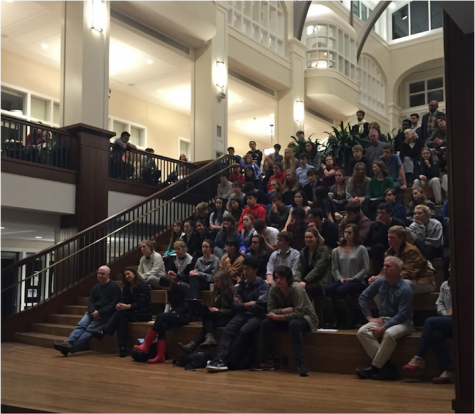
Students listen to Mike Morrell in the Sackett Forum.
Furthermore, he said, they believe that they are preparing for the end of the world, the Madi, which requires dividing the world into Muslims and non-Muslims.
Writers such as Brian Brivati, an Opinions writer for “The Guardian,” shine light upon the justification of terrorism. By no means should the massacre of civilians or the bombing of airports be regarded as “justified acts,” but these acts must be seen through a non-Western perspective. Morell highlighted the responsibility that needs to be taken by Western civilizations to counteract the threats the Middle Eastern nations feel. According to most definitions, terrorism can be justified if a “state has a monopoly on violence” but if any other group utilizes violence then it is illegitimate. “If this were true, then, when Nelson Mandela dies, he should be universally condemned as nothing more than a terrorist and murderer— something the Thatcher government liked to call him,” said Brivarti for “The Guardian.”
Even though it is not possible to view the situation from an objective standpoint, it is possible to attempt to suggest rational ideologies that defend those principles. Middle Eastern terrorist groups are portrayed in the media as they are because people support some terrorism and not others, because they see some as moral and others as malicious.
Morell noted that action needs to be taken. As he stated, from 1998 to 2014, only 60 percent of the CIA finance budget was utilized in order to counteract terrorist threats in America.
A second dynamic is the failure of governance and economic policy throughout the Middle East. Morell explained how in much of the area there is so much uncertainty that parents are unsure if their children will have a better life than they did. There lacks an ability to carry out good administration, Morell said, to provide what is necessary for the common good. With the exception of Lebanon, trends show that secular leaders are not able to govern efficiently.
Lastly, the evident tension between Iran and the Persian Gulf states acts as the third dynamic. What Iran ultimately desires is hegemonic power: it wants to be the head of the Middle Eastern table, Mr. Morell said. “It’s not what everyone believes—that it is a Sunni-Shia conflict—but it’s a Persian and Arab conflict.”
These three dynamics apply to Syria, Yemen and to some extent to Libya. What the United States truly needs to focus on is putting its arms around the bigger situation and preventing the creation of terrorist groups for the near future. Clearly, this is not an easy problem to fix.
Lilias bids a warm Canadian welcome from Oakville, Ontario. She has written for the Circle Voice since Second Form and enjoys writing for the News and...


